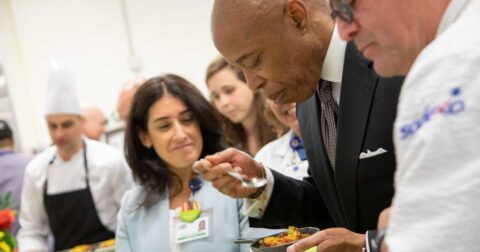News
People Can Give Cows Tuberculosis, But We Rarely Look For It
Health•5 min read
Solutions
A partnership between Mayor Eric Adams, Sodexo and NYC Health and Hospitals aims to boost community health through culturally relevant plant-based meals.


Words by Julieta Cardenas
At the Sodexo Culinary Center in Brooklyn, members of the press, representatives from the New York City Mayor Eric Adams’ office and chefs gathered for an unlikely food tasting — vegan hospital food. Hosted by the Mayor’s Office of Food Policy, the menu featured a jerk mushroom with collard greens, sancocho (a Latin American stew), pea pesto penne, and even a vegan panna-cotta, or in these circles, plant-based. The idea behind the partnership between NYC Health and Hospitals, the Mayor’s Office of Food Policy and Sodexo, a multi-national catering and facilities management company, is that people in hospitals should have nutritious food available without having to miss out on taste and flavor. So far, the partnership has served over a million vegan meals in New York City hospitals.
Options are meant to reflect the cultural background of New Yorkers, and the effort has become a model for other cities like Coppenhagen and LA. The New York City program launched in 2022, originally as a lunch program that is now offered across 11 city hospitals.
New York City Mayor Eric Adams has spoken about how a plant-based diet has helped him reverse type-2 diabetes — a claim backed up by observational and interventional studies. Since 2021, the city’s Office of Food Policy has been working to make institutions like hospitals and schools more plant-based, part of a broader campaign to improve health and sustainability for New Yorkers. Nearly one million New Yorkers have diabetes and the partnership with hospitals aims to improve population health through modeling healthier eating habits. As part of the Mayor’s Office of Food Policy 10 year plan, plant-based options are highlighted as a climate mitigation tool and the office seeks to expand access to these options.
The campaign in New York City reflects a larger trend to boost health outcomes through dietary changes. The emerging field of lifestyle medicine has begun to gain traction as a tool policy makers can use to nudge population health in a better direction, with nutritional health as a cornerstone. A review from the School of Medicine at University of Missouri-Kansas City found that a whole-food plant-based diet was shown to “promote weight loss and ameliorate so-called lifestyle-diseases.”

Dr. Michael Katz, NYC Health + Hospitals President and CEO, spoke to the gathered crowd about an interaction with Mayor Adams who asked him, “What does it mean to patients’ understanding of food if in the hospitals you are serving them food that isn’t the most healthful?” The conversation prompted Katz and his team to re-consider the importance of hospital food in serving as a role model for patients. Sodexo employs chefs and nutritionists to ensure the plant-based meals served at New York City hospitals will be healthful as well as appealing.
The facility where the meals are prepared send out 15,000 meals a day on four-trucks that have never missed a delivery, not even during snowstorms. All of the food I got to try at the tasting was prepared at the facility and will be served in hospitals. Food is made, sealed shut, labeled, and finally stored in a blast chiller where it awaits pick-up by Sodexo’s trucks.
A plant-based patient menu authored by Chef Philip DeMaiolo and registered dietitians includes recipes for soups, sandwiches, mains, sides and desserts. The project also helps save money — plant proteins tend to be cheaper than meat — which is then redirected to further patient care, says Dr. Katz.
While patients can still order a meat or dairy dish, the vegan options are the default, a move that utilizes the theory of choice architecture to encourage patients to eat more plant-forward meals. Choice architecture is how researchers describe the design and presentation of food options to encourage people to select healthier alternatives without imposing absolute restrictions. The reasoning: food choices are not necessarily made rationally, and people are highly influenced by the placement and presentation of options, either on a menu or, in cafeterias, by the behavior of those around them.
Schools across the country have adopted similar strategies for encouraging students to opt for default vegan options in cafeterias. Some studies show this approach works. A randomized control trial of making plant-based meals the default at college events found that students were nearly 4 times as likely to select plant-based mains when that was their assigned default meal.
Part of the success, in New York City and elsewhere, just might be the diverse array of culinary offerings. Kate MacKenzie, Executive Director at the Mayor’s Office of Food Policy, tells Sentient, “these incredible teams are able to pull together to bring in the cultural difference and taste of our great city of New York.”